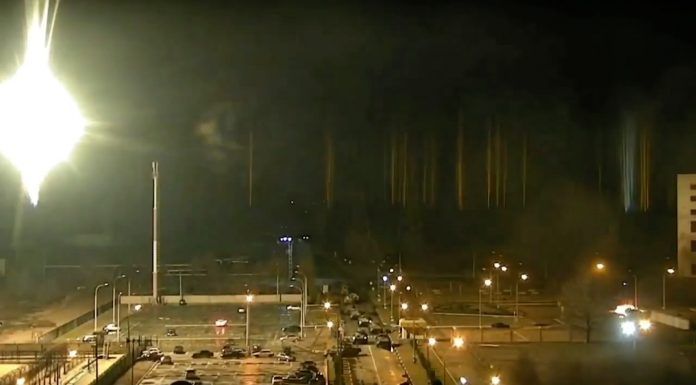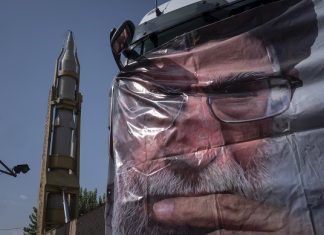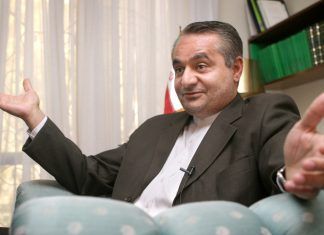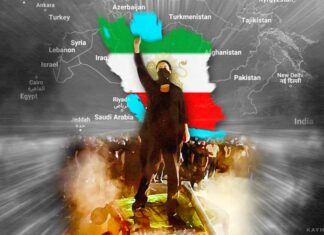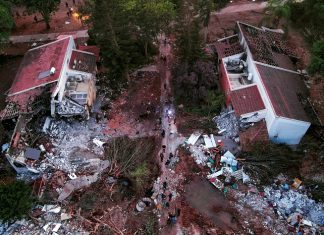By Bahram Ghiassee and Abbas Faiz
[Dr. Bahram Ghiassee ([email protected]) is an International Nuclear Law specialist. Mr. Abbas Faiz ([email protected]) is an International Human Rights and Humanitarian Law expert. They have contributed this opinion piece to Kayhan Life. The views expressed are their own.]
The ongoing Russian military aggression against Ukraine is causing significant humanitarian and environmental impacts within Ukraine and beyond. Armed conflicts and military activities pose major threats to people and ecological systems, wherever they occur, and the conflict in Ukraine is proving to be no exception.
Russian military strikes on oil and gas storage tanks, the exhaust gases emitted from the convoys of military vehicles, detonations, explosions, and raging fires are having a detrimental impact on the people, the urban environment, and the natural environment in Ukraine.
Moreover, the Russian President’s statement that the country’s nuclear forces have been placed on high alert, and that there may be justification for the use of nuclear weapons where there is an existential threat to Russia, have added yet another dimension to the conflict: the threat of nuclear confrontation. This has rekindled somber memories of the devastation and destruction caused by the atomic bombs dropped on Hiroshima and Nagasaki in 1945.
The Russian seizure of the Chernobyl nuclear power plant (NPP) has, equally, reawakened the fears and anxieties experienced by millions of people following the Chernobyl nuclear accident in 1986. As none of the four nuclear reactors are operational, a repeat of the 1986 accident is impossible. However, large quantities of radioactive waste are stored at the site, posing a major threat if it is attacked.
[aesop_image img=”https://kayhanlife.com/wp-content/uploads/2022/03/2022-03-23T194000Z_1670864355_MPCRTR0009J4H4T_RTRMADP_3_MAPCREATOR-OSM.jpg” panorama=”off” credit=”Map: Forest fires near nuclear power plant Chernobyl, Ukraine. ” align=”center” lightbox=”on” captionsrc=”custom” captionposition=”left” revealfx=”off” overlay_revealfx=”off”]
Indeed, on February 26th, an electrical transformer at a radioactive waste facility near Kharkiv was hit by a Russian missile, and the following day another radioactive waste disposal site near the capital, Kyiv, was hit. However, neither facility was damaged, and no radiation leak was detected.
The subsequent aerial attack on the Zaporizhzhia NPP, and the ensuing fire at a nearby building on the site, is a further manifestation of the fragility of the situation, and the significant threat posed to nuclear installations and associated facilities in Ukraine. The plant, which is currently under Russian control, is the biggest nuclear power plant in Europe, housing six nuclear reactors.
The security and safety of radioactive sources – used in industry, academic institutions, and the medical field – and associated facilities also need to be assured, to prevent illicit acquisition of radioactive sources by terrorists and criminals. According to the IAEA, the port city of Mariupol uses such radioactive sources, and currently there is no information as to their status.
Ancillary facilities providing electricity, cooling water, etc, to nuclear reactors are, equally vulnerable to sabotage, artillery attacks, and missile strikes. Damage to such facilities, regarded as soft targets, could eventually result in catastrophic release of radioactivity, as witnessed in the Fukushima nuclear accident in Japan, in 2011. Ukraine’s 15 nuclear reactors, located at four different sites, are thus under threat.
Parallels can be drawn between the current situation in Ukraine and possible future developments in Iran. Over the past three decades, Iran has acquired a comprehensive range of nuclear technologies and facilities, with dual-use applications in civilian and military nuclear programs. Iran has also acquired advanced missile capabilities which could be used for defensive and offensive purposes.
These developments have alarmed a number of countries in the Middle East and North Africa (MENA) region and beyond. Military attacks on Iran’s nuclear sites – declared and undeclared – could result in an extensive release of radioactivity, affecting people and the environment. Attacks on the Bushehr Nuclear Power Plant’s cooling water supplies and external electricity supplies could result in extensive damage to the reactor, and the release of radioactivity into the air and the Persian Gulf. Radioactive contamination could result in disruption to oil and gas exploration, shipping, fishing, and water supplies in the whole region.
Equally, missile and drone strikes on Iran’s military sites, munitions depots, and critical infrastructure – in particular, oil and gas wells; storage tanks; and pipelines – could result in extensive harm to people and the environment, bringing abject poverty to the Iranian people.
The regime in Iran would then have no choice but to retaliate directly against the Arab states, attacking their critical infrastructure, including the nuclear installations in the United Arab Emirates. Iran would also attack Israel’s extensive range of nuclear facilities, be it indirectly, though its proxies in the region.
The regime in Iran needs to take note of the humanitarian and environmental crises in Ukraine, and to make every diplomatic effort in bringing peace, stability, and prosperity to the region. Equally, the international community needs to support the creation of a ‘Middle East Nuclear-Weapon-Free Zone’, first proposed to the United Nations by the late Shah of Iran in 1968, and again in 1974.
Moreover, the nine nuclear-capable states —- namely, China, France, India, Israel, North Korea, Pakistan, Russia, UK, and USA — must eliminate their nuclear weapons, and join the Treaty on the Prohibition of Nuclear Weapons. In this context, and to remove the threat of nuclear confrontation, nuclear weapons stationed in Europe and Turkey, under NATO’s nuclear deterrence policy, need to be removed.
Maximum pressure, using diplomatic, economic, and financial measures, needs to be maintained to secure an early resolution of the conflict in Ukraine, and to ensure that Russia is brought before the international courts and tribunal for its violations and military aggression.
The sanctions which, to date, the West has imposed against Russia fall short of the support that Ukraine is expecting from its allies. Nonetheless, they have the potential to limit the flow of resources to the Russian army, thus affecting their morale, and their ability to engage in continued war crimes. US President Joe Biden’s announcement on March 8th that the US is “banning all imports of Russian oil and gas and energy” is indicative of that commitment.
Russian forces are facing tough resistance from the Ukrainian armed forces, and a growing army of volunteers. Also, arms transfers from Ukraine’s allies continue to strengthen their resolve. Notwithstanding, the stark reality is that Putin’s forces will continue to cause mayhem in Ukraine, and will aim to install a satellite government in Kyiv, akin to the regime in Belarus.
The atrocities committed in Ukraine constitute violation of the law of armed conflict, or International Humanitarian Law, which governs the conduct of warring parties. Breach of this law requires the parties to the conflict to bring the perpetrators to justice through a national tribunal that provides a fair and impartial trial. Where this is not possible – for example, if the State in question is unwilling or unable to conduct such a trial – the matter may be referred to an international court or tribunal.
Investigating and prosecuting such atrocities fall within the jurisdiction of the International Criminal Court (ICC). On March 1, 2022, the Court’s Prosecutor sought and received authorization from the Court “to open investigation into the Situation in Ukraine”. This followed the referral by 39 States for the Court to open an investigation in this regard. Pending the outcome of the investigation, persons who have committed, ordered, incited, or contributed to the commission of such crimes would be liable to prosecution under International Humanitarian Law.
Moreover, in relation to the ‘Crime of Aggression,’ the UN Charter prohibits the violation of the sovereignty and territorial integrity of UN Member States. President Putin’s invasion of Ukraine, a sovereign state, thus constitutes an act of aggression. It is argued that there was no justification for the Russian aggression, under international law, as Ukraine had not used or threatened to use force against Russia. Self-defense may also be invoked as justification for aggression, under Article 2(4) of the UN Charter, but in this case the UN Security Council (UNSC) has not mandated it to be lawful.
Russia’s aggression, however, cannot be addressed by the ICC, as it has not ratified the Statute of the ICC. Nor could the UNSC refer the matter to the ICC, as Russia would veto such a resolution.
To seek legal remedy, on 26 February 2022, the Ukrainian government submitted an application to the International Court of Justice (ICJ), which has the authority (jurisdiction) to hear disputes between UN Member States. On March 16th, the ICJ delivered its Order indicating that “The Russian Federation shall immediately suspend the military operations that it commenced on 24 February 2022 in the territory of Ukraine”.
Ukraine is also considering the commencement of proceedings against Russia in the European Court of Human Rights, as Russia is a party to the European Convention on Human Rights.
In addition, a group of eminent international lawyers and two former UK Prime Ministers, Gordon Brown and John Major, have proposed the creation of a special tribunal, with specific focus on the crime of aggression. Political support at international level is needed for such an initiative to succeed. Already, more than 740,000 people around the world have backed the creation of this tribunal. There is a strong possibility that a special tribunal will be instituted by the UN General Assembly in the months to come.
Putin may block a UNSC vote against his aggression, but he will not be able to escape justice through a special tribunal.
The fate awaiting him should remind the rulers of the Iranian regime that they, too, will not escape justice. The mass executions of prisoners in 1988 have already been identified as war crimes in the charge sheet against Hamid Nouri, currently on trial in Sweden. The regime’s mass killing of thousands of protesters in successive peaceful demonstrations in Iran amounts to a crime against humanity, a charge that will remain firmly in the records of the Iranian regime’s rulers and operators who could, at some point, stand trial before a special tribunal.


